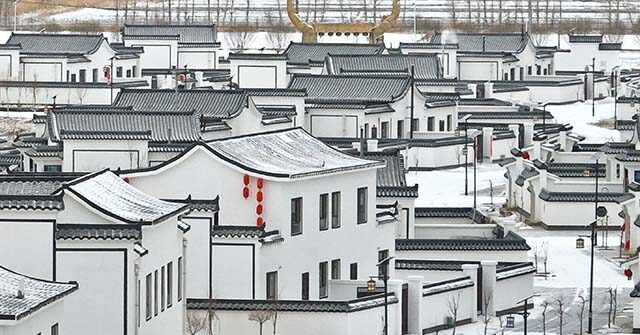Top News
China’s Real Estate Crisis Gets Worse

New home prices in China slipped again in January, and existing home sales slipped even more, notching the steepest decline in nine years.
The latest unhappy numbers suggested Beijing’s efforts to shore up the tottering real estate market have not been successful and some of China’s biggest real estate companies remain on the verge of collapse.
The Wall Street Journal (WSJ) on Friday crunched the latest numbers from China’s National Bureau of Statistics and found new home prices dropped by 1.24 percent in January year-on-year, while used homes slid 4.4 percent. Prices were also down in December, but the trend is accelerating.
“Real estate has for years been a popular investment for people in China, and the slowdown in the sector has had widespread ramifications. Consumer confidence is near its lowest level in more than three decades, according to a government survey. The economy is suffering from deflation, slowing exports and subdued investment by private businesses,” the WSJ observed.
The real estate crisis is especially troublesome because China’s property market grew to an immense size during its boom years. Small investors came to see real estate as one of the safest bets they could make and young professionals migrating to fast-growing cities needed somewhere to live.
Furthermore, Chinese local governments derive a great deal of their revenue from real estate taxes and fees, so the real estate collapse has left them deeply in debt – possibly as much as $11 trillion in debt. Lenders also plunged into debt as high-flying property developers like China Evergrande suddenly stopped repaying their loans and collapsed into liquidation.
“Private surveys show China’s 100 largest developers recorded a deep slump in new-home sales in January. They sold homes valued at $32.8 billion, down 34% from a year earlier, marking the worst month of sales since at least July 2020,” the WSJ reported, citing data from China Real Estate Information.
So far, Beijing has tried deregulating home purchases, pumping billions of dollars into new real estate projects by reliable “white-listed” developers, and cutting loan rates. None of it has worked to reverse the slump, possibly because home buyers are so skittish that low-interest loans are no longer enough to entice them to buy. Many Chinese home buyers have been stuck making mortgage payments on homes that will never actually be built.
A slightly less gloomy analysis from Bloomberg News on Thursday found some indicators that the decline in home prices is slowing in a few choice markets, particularly the capital of Beijing, major regional business hubs, and towns noted for attractive vacation homes.
The government is making a big push to sell off troubled housing projects from distressed developers like Country Garden Holdings at discount prices – a plan strongly favored by the International Monetary Fund (IMF), which believes it is worth losing some value from Chinese real estate to contain its enormous risks.
At least one analyst, E-House China Research and Development Institute research director Yan Yeujin, was willing to predict that “the slide in home prices may have passed its worst period.” Most of the analysts who spoke to the WSJ, on the other hand, expected a worsening trend throughout 2024.
The IMF was less chipper, projecting that real estate investment will fall up to 60 percent below 2022 levels before a gradual rebound might begin. Almost every foreign analyst thinks the Chinese government needs to take stronger measures to save real estate; the IMF suggested “more market-based adjustment in home prices,” “quickly restructuring insolvent developers,” and eliminating rules that allowed banks to avoid recognizing bad loans to real estate developers.
“Insuring homebuyers against the risk that developers fail to complete purchased homes could help restore confidence and ease sales pressures for developers,” the IMF added, addressing that lingering fear among Chinese home buyers that they will be saddled with huge mortgages for houses and apartments they can never live in.
The IMF wrote a report in December that predicted “fundamental demand for new housing” would fall by 35 percent to 55 percent over the next decade, because people are less eager to flock to big cities now that the job market has grown cold, and there are so many “unfinished or vacant properties” to sell off.
China’s representative to the IMF, Zhengxin Zhang, rejected the report and insisted “a significant decline in housing demand is very unlikely to happen.”
Read the full article here


















